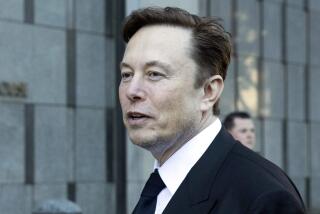Possible Violations of Tough New Securities Law : Probe in Britain Targets Guinness
- Share via
LONDON — Guinness PLC, the British brewing giant, is feeling the heat of being the first major target of a securities investigation by the government since Britain deregulated its financial markets.
The first victim of the probe might be Guinness Chairman Ernest Saunders, who is under increasing pressure to resign as shareholders have watched the company’s stock price tumble--despite Guinness’ growing profitability.
Guinness has been buffeted by disclosures of possible securities violations involving its stock, and an investigation by Britain’s Department of Trade and Industry focuses on trading in Guinness stock while Guinness was acquiring Distillers Co. Ltd. last year.
It marks the first major probe by the department since Britain deregulated its markets Oct. 27, an event known as the “Big Bang.” In light of the Big Bang, Britain also passed a law aimed at preventing trading abuses that, among other things, enhanced the department’s investigative powers.
However, Paul Channon, the trade and industry secretary, has removed himself from the inquiry because he is a member of the Guinness family.
Guinness maintains that Saunders will not resign despite pressure from institutional shareholders to limit the uncertainty surrounding the brewer, the London Times said.
Saunders is not giving interviews and the company overall is declining to comment, a Guinness spokesman told the Associated Press.
Guinness acquired Distillers for $3.8 billion last April, after a bitter, months-long takeover battle with Argyll Foods PLC, a supermarket chain. But the purchase has been plagued by controversy almost from the beginning.
Most recently, there has been speculation that Guinness, in a possible violation of British law, arranged for the repurchase of 2.1 million of its own shares to boost its stock price, thus making its cash-and-stock offer for Distillers more attractive in the bidding war with Argyll.
In addition, Morgan Grenfell Group PLC recently quit as Guinness’ investment banker amid a public dispute over who might have been responsible for the alleged share repurchase. And one of Grenfell’s finance experts, Roger Seelig, who advised Guinness on the Distillers bid, resigned from the merchant bank.
Guinness also disclosed last month that it had entered into an agreement, shortly after acquiring Distillers, to invest $100 million in a fund managed by Ivan F. Boesky. Boesky, formerly Wall Street’s top takeover speculator, settled U.S. government charges of insider trading last month in part by paying a record $100-million fine.
Boesky in turn had bought a stake in Distillers and ultimately pledged it to Guinness. Guinness has denied that it made any deal with Boesky and said the investment was just that, an investment.
Meanwhile, Schenley Industries Inc., a beverage conglomerate that distributes the No. 1 brand of Scotch in the United States--Distillers’ Dewar’s--disclosed in December that it purchased more than 5% of Guinness’ stock in April through a holding company.
Schenley’s lawyers pleaded ignorance of a British law that requires companies to disclose a 5% or larger interest in a company within five days.
Schenley’s parent is Rapid-American Corp., a U.S. retailer and liquor marketer controlled by entrepreneur Meshulam Riklis.
Schenley has retained the right to sell Dewar’s and also has been given the distribution rights for Distillers’ Gordon’s gin in the United States. Its Guinness stake later was diluted to 3.5% when the brewer issued shares as part of the takeover.
In an earlier controversy, Saunders assumed the additional post of chairman of the combined Guinness and Distillers although the job had been promised to the governor of the Bank of Scotland. In an apparent placatory gesture, Guinness later appointed four independent directors.
Saunders, 51, is first non-family member to serve as Guinness’ chairman.
Nicknamed “Deadly Ernest,” Saunders joined Guinness five years ago from Nestle SA, the Swiss food giant. Taking over as chief executive, he found Guinness’ profits under pressure from the company’s unsuccessful effort to diversify and reduce its dependence on brewing.
Saunders opted instead to make Guinness one of the world’s largest drinks marketers, and in two years he closed down or sold about 140 non-brewing companies, reduced the work force and introduced new advertising.
The company’s market value has soared to more than $3 billion from $132 million in 1981, and Guinness’ profit has surged as well. Its pretax profit jumped 180% to $354 million in the year ended Sept. 30, while revenue climbed 96% to $3.42 billion.
More to Read
Inside the business of entertainment
The Wide Shot brings you news, analysis and insights on everything from streaming wars to production — and what it all means for the future.
You may occasionally receive promotional content from the Los Angeles Times.








